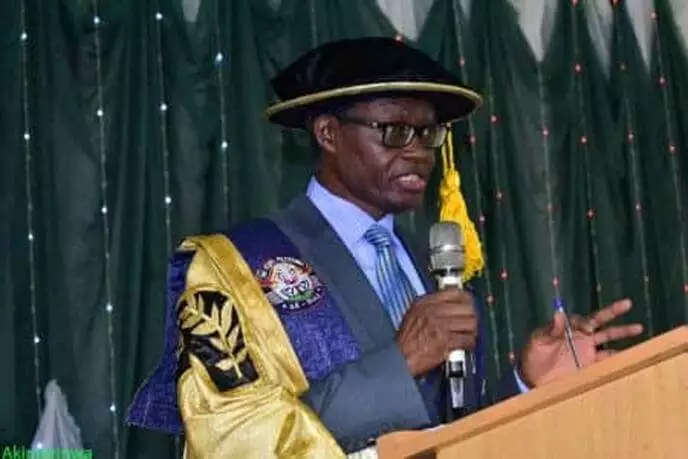A former Director General of the Nigeria Institute of International Affairs, (NIIA) Prof Bola Akinterinwa, has observed that the growth of polytechnic education in Nigeria has been stunted due to poor funding and inept leadership.
The former NIIA boss also called for the establishment of Polytechnic Commission in the country.
Akinterinwa spoke while delivering the fourth Foundation Anniversary Lecture of the Federal Polytechnic, Ile – Oluji in Ondo state titled: “Polytechnic Education in National Development: Global challenges and strategic leeway for the FEDPOLEL in Nigeria.”
While enumerating some of the problems causing the stunted growth of Polytechnic Education in Nigeria, stated that “poor leadership; financial crisis and poor funding; poor infrastructure; management; dichotomy between University Education and Polytechnic Education, or poor perception of Polytechnic Education; brain drain; lack of Polytechnic Commission; volatile and militant students’ unionism, secret cults, examination malpractices and sexual harassments, among others.”
Citing a Polytechnic teacher, Obasi, he stated that “Polytechnics exist to boost industrialization efforts, create technical manpower and especially middle-level cadre to contain the industrial dynamics, develop indigenous technical capacities for self-reliance, and make up for the inadequacies of ill equipped Universities in terms of technical contents, and technical skills development.
“Today, the situational reality in Nigeria points to the sad fact that the objectives of Polytechnic education have not been fully realized as noted earlier.
“The problem is not simply that there is unemployment of many graduates, but more seriously that the few graduates who are lucky to get employed are underemployed, not well-paid, and are rated as middle or low-level employees in the Technical Manpower Team. This should not be so.
“Thirdly, Polytechnic education is, and should always be, an instrument of sustainable national development. It is yet to be seriously taken as such.
“The implication of this is that opportunities through access to information and advanced technologies have been made available to all educational institutions particularly technical education institutions in the globalized world.
“There is the need for total restructuring of the polytechnic educational system, with emphasis on creative thinking, entrepreneurial skills, positive social and cultural values.
“Put differently, the review of the structure of Polytechnic education in Nigeria and their relevance to current global and national socio economic developments towards the realization of sustainable national development must be taken as a desideratum.”
Akinterinwa criticised the unimpressive way polytechnic education is being handled by the nation’s policy makers, saying: “First, my appreciation is against the background of my strong belief that polytechnic education cannot but be the bedrock of a self-reliant industrial development in any developing country.
“In many parts of the developed world, polytechnics also have a university status and award undergraduate and post-graduate degrees. Many global leaders also have polytechnic educational background.
“Yet, in Nigeria, whose government recognised in the 1980s the need for a Crash Programme and therefore sent hundreds of students abroad to acquire technical education for purposes of mid-level manpower, has not given due attention to monotechnic and polytechnic education.
“In fact, impression is wrongly given, because of differences in the scope and methodology of teaching and learning, that polytechnic education is inferior to university education.”
He noted that despite the recent Federal Government’s decision to put first degree and HND holders on the same pedestal, the perception of inferiority is still much there.
He agreed with the observation of Mr. Obafemi Omokungbe that “the perception of polytechnic education in Nigeria is not what one should be proud of.
“Many, even among policy makers, still view polytechnic education as inferior compared to university education. This inequality and perception continue even when government has stated its willingness to remove the dichotomy between polytechnic certificate and University B.Sc.”
Akinterinwa said: “In addressing this lecture topic, let me respectfully ask you what your understanding of polytechnic education nationally and globally is. What should we mean by national development in a globalizing world?
“Can there be national development without community development that is a constituent of it? If the whole world is considered a community, and even as a village, is Nigeria not a community and another village? Is Ile-Oluji kingdom not a community, not a village?
“In every sense, to me, any community where the people are not belligerent, where there is peace and tranquility derived from traditional parliamentary democracy and where development policies predicated on self-reliance, altruism and rule of law, such community cannot but be a global village per excellence and should be internationally emulated. Ile-Oluji is undoubtedly a community, a global village that is worth seriously studying as a model.”
Discover more from The Source
Subscribe to get the latest posts sent to your email.








